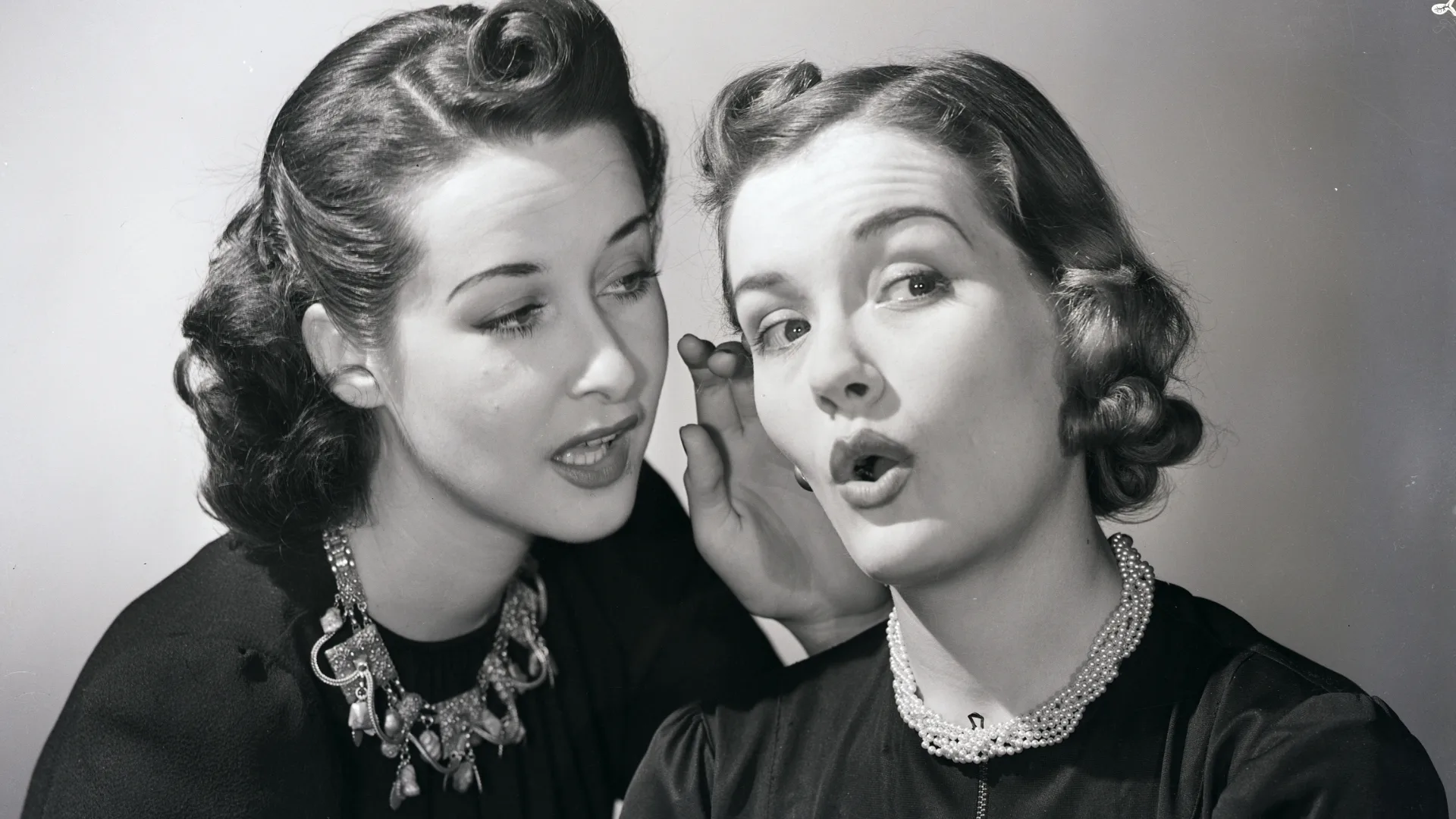Picture this: it’s just the two of you. You’re in a dimly lit bar or a covert corner of the office, maybe you’ve found a quiet spot at a crowded party. Whatever the scene, something is in the air, you can feel it.
They lean in towards you – the moment is finally here – and in a low voice say those three magical words: “Just between us …” To be on the precipice of a good piece of gossip is electrifying. Are you about to hear of a friend-of-a-friend’s illicit affair? Or has someone been caught stealing? Maybe you’re about to find out who comes from family money (that would explain everything!) or maybe someone you both know has just done something really weird. It almost doesn’t matter what the piece of gossip is, you must know everything.
That’s the exact concept behind American journalist Kelsey McKinney’s podcast, Normal Gossip. Listeners leave her three-minute voicemails, detailing the juiciest piece of gossip they’ve heard about someone they know. McKinney retells the story to her podcast guest, who gasps and laughs and cringes as she expertly recounts the details, ensuring all parties are kept anonymous.

There was the girls’ trip through South East Asia that was clearly doomed from the start and gets more wacky as it goes on; there was the girl whose boyfriend’s father had an affair with his son’s former schoolmate, and whose wife came home to find the young pregnant girl in her house; and the camping trip that involves an affair in a tent and a dog named Pancake.
Listening to these low-stakes morsels of gossip is like pouring triple-distilled joy straight into your ears: it goes down smooth and leaves you with a happy buzz, and a smirk that is probably suspicious to the other people on your bus.
Now, McKinney’s written a book, You Didn’t Hear This From Me: Notes on the Art of Gossip, in an attempt to redeem the practice’s bad reputation. She relies on academic research, historical texts, politics, urban legends, conspiracy theories and Bible passages – with a healthy dose of Real Housewives, Britney Spears, social media and Doja Cat lyrics – to prove that gossip is a fundamental human behaviour that deserves to be taken more seriously and offered more critical thinking. It’s an evolutionary tool, social glue, a bonding tactic, a warning system, a way to share values, and – in its most simple interpretation – fun.
Gossip has long been demonised as the idle talk of simple women who have nothing better with which to fill their minds than the business of other people. But its true meaning is anything that’s said about someone in your social network who isn’t present. With this definition in mind, researchers have found that we all do it – men and women in equal measure – and that we’re adept gossipers by the time we’re five years old.

A 2019 study found that people spend more than 50 minutes a day on average gossiping, which means anyone who thinks themselves superior and says they don’t gossip simply calls it something else. (A bunch of guys down at the pub talking about their favourite footy players? That’s gossip.) If you don’t think you gossip, just try getting through a day without being in a conversation about someone who isn’t there. It’s impossible.
The British anthropologist and evolutionary psychologist Robin Dunbar believes that humans developed language for the distinct purpose of gossiping. Back when we lived in caves, it was a way to pass on useful information about who to trust and to encourage cooperation – people are better behaved in front of gossipers because they don’t want to be their next subject. “Language is primarily for maintaining social relationships, rather than just conveying information and facts,” explains Professor Nick Enfield, a linguistics director at the University of Sydney’s Social Sciences and Humanities Advanced Research Centre.
“Language is designed for persuasion, it’s for getting people on your team and managing social relations.” The crucial thing about gossip, he says, “is that it’s you taking a stance on the things you’re talking about. You’re telling the other people in your social network, ‘Isn’t this outrageous,’ ‘I disapprove of this behaviour.’” Far from being a practice of the small- or empty minded, gossiping is an advanced social skill that requires emotional intelligence, social awareness and curiosity about other people’s lives (as opposed to being self obsessed).

To be a good gossip, a person needs to have elite communication skills in order to relay information in a way that isn’t misconstrued and is easy to remember, so they don’t risk starting a dangerous game of Telephone. Note that in the title of her book, McKinney refers to gossip as an art. This is exactly how she treats it. A colourful raconteur, McKinney says that what drew her to gossip was never so much what the story was, but how it was delivered.
She’d practice her inflections, her tone, rehearse pauses and landing the punchline, turning gossip into performance. But she also refers to gossip as an art because it’s something that needs to be considered and taken seriously. “We tell one another stories, we always have,” writes McKinney. “That is how we make sense of the world, with ourselves at the centre reaching outward trying to connect with others … What is art if not a reminder that we are not alone here on this earth?”
We tell ourselves stories in order to live, said Joan Didion. And we tell each other stories in order to work out how we should live. Are we doing it right, or are they doing it wrong? Where a good gossip is like a curator – holding each piece of information up to the light to see its true purpose and then displaying it in service of others – a bad gossip is driven by ego or virtue signalling, with the reputation of their target simply collateral damage of their self serving agenda.
“Gossiping can be used to strengthen cooperation, but it can also be used for competition, to destroy someone’s reputation,” says Bianca Beersma, a professor in organisational behaviour in the Department of Organization Sciences at VU University, Amsterdam.

That duality of gossip is what attracted her to research the topic. “People gossip for different reasons – some are neutral or even somewhat noble, whereas others are clearly negative. The reason someone gossips may tell you more about that person than the fact that they gossip.” And the types of gossip you’re drawn to say a lot about you, too.
As everyone finds out at some point, you can’t gossip with just anyone. “Gossip requires a kind of mutual vulnerability, an innate trust,” writes McKinney. “When we gossip with someone, we bring them information in the hope that they will trust it, knowing that they will judge us based on its quality and verifiability.”
“The reason someone gossips may tell you more about that person than the fact that they gossip”
Professor Bianca Beersma
We’re also trusting that they won’t use the information in a way that’s going to cause trouble for the subject – or ourselves. Secrets are important for bonding, adds Enfield. “When someone gossips with you, they show that they trust you. It’s saying, ‘I know something you know and no-one else knows,’ and that brings us closer together,” he explains.
As a child growing up in an Evangelical church in Texas, McKinney was taught that gossip was an affront to God. On the scale of sin from one to 10 – one being dancing, nine being adultery and 10 being murder – gossip was definitely higher than five. And yet she could never help herself. “For years, I prayed that God would take away my desire to gossip,” she writes.

She scrawled on her mirror the bible passage Ephesians 4:29: “Do not let any unwholesome talk come out of your mouths.” When it came to finally choosing between her faith and her gossip, it felt more like a choice between her religion and herself. She chose herself.
Now that she gossips for a living, she sees how institutional disdain for gossip can be a way to preserve the status quo. As gossip seeks to hold people to account for their actions, it’s a threat to those in power. Just think of the whisper networks that eventually kicked off the #MeToo movement.
“For years, I prayed that God would take away my desire to gossip”
Kelsey McKinney
Gossip has historically been an important tool for women and minorities, acting as a subtle warning system about who is safe and who should be avoided. Research from the University of California, Berkeley, named this specific type of gossip “prosocial gossip”: it’s used to warn others and can lower rates of exploitation. Gossip can be a check on power and a source of solidarity, but gossip’s bad reputation means whisper networks can also fail.
When people in power get a whiff of the gossip circulating, by branding it as such they can allude to it being a rumour perpetuated by simple-minded women, sucking all the air out of it. McKinney also delves into the world of celebrity gossip, which she calls “entitlement gossip”. “Our curiosity is at odds with their desire for and perhaps right to privacy,” she writes.

The history of celebrity gossip is a messy one, with real harm done to many an A-lister. In the 1990s to mid-2000s, the gossip industry was swollen and running on the fuel of its own enthusiasm. We knew it was an invasion of their privacy, but we couldn’t get enough. “[Celebrity gossip] allows us to believe that the rich and famous are no better than the rest of us,” writes McKinney.
Ros Reines was a gossip columnist for years. Her name was synonymous with celebrity gossip, and her speciality was the Sydney business and socialite beat. A transcript of our interview shows that within just two minutes we were already gossiping about industry people we both knew. Reines believes we’re drawn to celebrity gossip “to make ourselves feel better when they mess up”, she says, referencing a high-flyer with a beautiful wife who can’t stay out of trouble. “It shows us what life’s really about: it’s not always rosy, we mess up. I also think gossip is simply fun.”
Now that celebrity gossip has mostly moved to social media platforms, Reines is enjoying its democratisation. “Before, it would have been manufactured gossip where [a publicist] goes straight to a magazine and gives them a line, but now there are more citizen gossips: people from film sets or who knew someone who was on set.” These days it all takes place over blind items sent into Instagram accounts like @deuxmoi. There are also dedicated screenshotters posting to @commentsbycelebs.
For Reines, celebrity gossip isn’t nasty, it’s entertainment. With her book, McKinney wants to remove the moralising and stereotypes from gossip. It’s not an inherently trivial or negative behaviour that exists within women’s circles. Sure, it can be nasty, but it would be impossible to refrain completely. Instead, Dr Khandis Blake, an evolutionary psychologist with a background in women’s studies, who works at the University of Melbourne, says it’s about taking a more nuanced approach. “As much as we could take a moral stance and say, ‘Don’t say anything disparaging about anyone else,’ sometimes people do bad things and you do have to talk about it.
It would be better to come at it with some critical thinking, and look into the truthfulness of the gossip.” Enfield agrees. “It’s not so much about trying to refrain from gossip, but being more mindful of your use of language,” he explains. “Gossip is useful, but you need to understand what you’re doing so that you can make choices about the risks involved. Don’t cross any lines you wouldn’t normally cross. And don’t do it over text.”
Related articles:
- Why Are We So Obsessed With Celebrity Relationships? A Psychologist Weighs In
- Female Feuds Sell, But What Does That Say About Us?
- The Toxic Truth To Our Treatment Of Female Celebrities



